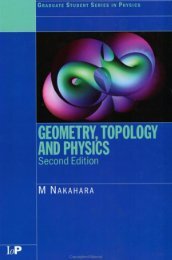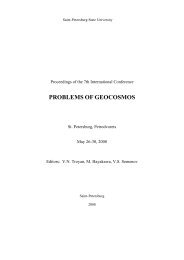- Page 2:
Quantum Gravitation
- Page 8:
Prof. Dr. Herbert W. Hamber Univers
- Page 14:
Preface Almost a century has gone b
- Page 18:
Preface ix mately leading to the Ei
- Page 22:
Preface xi thereof) have meaning an
- Page 26:
Acknowledgements Over the years I h
- Page 32:
xvi Contents 4 Hamiltonian and Whee
- Page 36:
Chapter 1 Continuum Formulation 1.1
- Page 40:
1.3 Wave Equation 3 One important a
- Page 44:
1.3 Wave Equation 5 e 01 + e 31 = 0
- Page 48:
1.3 Wave Equation 7 Fig. 1.1 Lowest
- Page 52:
1.3 Wave Equation 9 with s μν = 1
- Page 56:
1.4 Feynman Rules 11 One can exploi
- Page 60:
1.4 Feynman Rules 13 and the gravit
- Page 64:
1.4 Feynman Rules 15 where the p 1
- Page 68:
1.5 One-Loop Divergences 17 D = 2 +
- Page 72:
1.5 One-Loop Divergences 19 R 2 =
- Page 76:
1.6 Gravity in d Dimensions 21 1.6
- Page 80:
1.6 Gravity in d Dimensions 23 ∇
- Page 84:
1.7 Higher Derivative Terms 25 case
- Page 88:
1.7 Higher Derivative Terms 27 theo
- Page 92:
1.7 Higher Derivative Terms 29 ∫
- Page 96:
1.7 Higher Derivative Terms 31 trln
- Page 100:
1.8 Supersymmetry 33 treated pertur
- Page 104:
1.8 Supersymmetry 35 and Σ’s has
- Page 108:
1.9 Supergravity 37 δA μ = −2g
- Page 112:
1.9 Supergravity 39 The first order
- Page 116:
1.10 String Theory 41 of the string
- Page 120:
1.10 String Theory 43 Solutions to
- Page 124:
1.10 String Theory 45 and for the o
- Page 128:
1.10 String Theory 47 with [dg ab ]
- Page 132:
1.11 Supersymmetric Strings 49 One
- Page 136:
1.11 Supersymmetric Strings 51 of c
- Page 140:
1.11 Supersymmetric Strings 53 ∫
- Page 144:
Chapter 2 Feynman Path Integral For
- Page 148:
2.2 Sum over Paths 57 ∫ ∞ A(q i
- Page 152:
2.4 Gravitational Functional Measur
- Page 156:
2.4 Gravitational Functional Measur
- Page 160:
2.4 Gravitational Functional Measur
- Page 164:
2.5 Conformal Instability 65 ∫ I
- Page 168:
Chapter 3 Gravity in 2+ε Dimension
- Page 172:
3.2 Perturbatively Non-renormalizab
- Page 176:
3.2 Perturbatively Non-renormalizab
- Page 180:
3.2 Perturbatively Non-renormalizab
- Page 184:
3.2 Perturbatively Non-renormalizab
- Page 188:
3.2 Perturbatively Non-renormalizab
- Page 192:
3.3 Non-linear Sigma Model in the L
- Page 196:
3.3 Non-linear Sigma Model in the L
- Page 200:
3.4 Self-coupled Fermion Model 83 3
- Page 204:
3.5 The Gravitational Case 85 with
- Page 208:
3.5 The Gravitational Case 87 × ×
- Page 212:
3.5 The Gravitational Case 89 Next
- Page 216:
3.5 The Gravitational Case 91 1993a
- Page 220:
3.6 Phases of Gravity in 2+ε Dimen
- Page 224:
3.6 Phases of Gravity in 2+ε Dimen
- Page 228:
3.6 Phases of Gravity in 2+ε Dimen
- Page 232:
3.7 Running of α(μ) in Gauge Theo
- Page 236:
3.7 Running of α(μ) in Gauge Theo
- Page 242:
104 4 Hamiltonian and Wheeler-DeWit
- Page 246:
106 4 Hamiltonian and Wheeler-DeWit
- Page 250:
108 4 Hamiltonian and Wheeler-DeWit
- Page 254:
110 4 Hamiltonian and Wheeler-DeWit
- Page 258:
112 4 Hamiltonian and Wheeler-DeWit
- Page 262:
114 4 Hamiltonian and Wheeler-DeWit
- Page 266:
116 4 Hamiltonian and Wheeler-DeWit
- Page 270:
118 4 Hamiltonian and Wheeler-DeWit
- Page 274:
120 4 Hamiltonian and Wheeler-DeWit
- Page 278:
122 4 Hamiltonian and Wheeler-DeWit
- Page 282:
124 4 Hamiltonian and Wheeler-DeWit
- Page 286:
126 4 Hamiltonian and Wheeler-DeWit
- Page 290:
128 4 Hamiltonian and Wheeler-DeWit
- Page 294:
130 4 Hamiltonian and Wheeler-DeWit
- Page 298:
132 4 Hamiltonian and Wheeler-DeWit
- Page 302:
134 4 Hamiltonian and Wheeler-DeWit
- Page 306:
136 4 Hamiltonian and Wheeler-DeWit
- Page 310:
138 4 Hamiltonian and Wheeler-DeWit
- Page 314:
140 4 Hamiltonian and Wheeler-DeWit
- Page 318:
142 5 Semiclassical Gravity ordinar
- Page 322:
144 5 Semiclassical Gravity Î[g μ
- Page 326:
146 5 Semiclassical Gravity An alte
- Page 330:
148 5 Semiclassical Gravity with TT
- Page 334:
150 5 Semiclassical Gravity [ ] d d
- Page 338:
152 5 Semiclassical Gravity the cas
- Page 342:
154 5 Semiclassical Gravity essenti
- Page 346:
156 5 Semiclassical Gravity conserv
- Page 350:
158 5 Semiclassical Gravity ∫ E (
- Page 354:
160 5 Semiclassical Gravity of the
- Page 358:
162 5 Semiclassical Gravity One can
- Page 362:
164 5 Semiclassical Gravity that lo
- Page 366:
166 5 Semiclassical Gravity But the
- Page 370:
168 5 Semiclassical Gravity Fig. 5.
- Page 374:
170 6 Lattice Regularized Quantum G
- Page 378:
172 6 Lattice Regularized Quantum G
- Page 382:
174 6 Lattice Regularized Quantum G
- Page 386:
176 6 Lattice Regularized Quantum G
- Page 390: 178 6 Lattice Regularized Quantum G
- Page 394: 180 6 Lattice Regularized Quantum G
- Page 398: 182 6 Lattice Regularized Quantum G
- Page 402: 184 6 Lattice Regularized Quantum G
- Page 406: 186 6 Lattice Regularized Quantum G
- Page 410: 188 6 Lattice Regularized Quantum G
- Page 414: 190 6 Lattice Regularized Quantum G
- Page 418: 192 6 Lattice Regularized Quantum G
- Page 422: 194 6 Lattice Regularized Quantum G
- Page 426: 196 6 Lattice Regularized Quantum G
- Page 430: 198 6 Lattice Regularized Quantum G
- Page 434: 200 6 Lattice Regularized Quantum G
- Page 438: 202 6 Lattice Regularized Quantum G
- Page 444: 6.12 Scalar Matter Fields 205 A ij
- Page 448: 6.12 Scalar Matter Fields 207 defin
- Page 452: 6.13 Invariance Properties of the S
- Page 456: 6.14 Lattice Fermions, Tetrads and
- Page 460: 6.15 Gauge Fields 213 6.15 Gauge Fi
- Page 464: 6.16 Lattice Gravitino 215 and invo
- Page 468: 6.17 Alternate Discrete Formulation
- Page 472: 6.17 Alternate Discrete Formulation
- Page 476: 6.18 Lattice Invariance versus Cont
- Page 480: 6.18 Lattice Invariance versus Cont
- Page 484: Chapter 7 Analytical Lattice Expans
- Page 488: 7.2 Lattice Weak Field Expansion an
- Page 492:
7.2 Lattice Weak Field Expansion an
- Page 496:
7.2 Lattice Weak Field Expansion an
- Page 500:
7.2 Lattice Weak Field Expansion an
- Page 504:
7.3 Lattice Diffeomorphism Invarian
- Page 508:
7.3 Lattice Diffeomorphism Invarian
- Page 512:
7.3 Lattice Diffeomorphism Invarian
- Page 516:
7.3 Lattice Diffeomorphism Invarian
- Page 520:
7.4 Strong Coupling Expansion 243 w
- Page 524:
7.4 Strong Coupling Expansion 245 A
- Page 528:
7.4 Strong Coupling Expansion 247
- Page 532:
7.5 Gravitational Wilson Loop 249 G
- Page 536:
7.5 Gravitational Wilson Loop 251 F
- Page 540:
7.5 Gravitational Wilson Loop 253 I
- Page 544:
7.5 Gravitational Wilson Loop 255 c
- Page 548:
7.5 Gravitational Wilson Loop 257 I
- Page 552:
7.5 Gravitational Wilson Loop 259 T
- Page 556:
7.6 Discrete Gravity in the Large-d
- Page 560:
+O( 1 d 2 ) . (7.141) 7.6 Discrete
- Page 564:
7.6 Discrete Gravity in the Large-d
- Page 568:
7.6 Discrete Gravity in the Large-d
- Page 572:
7.7 Mean Field Theory 269 ξ ∼
- Page 576:
7.7 Mean Field Theory 271 The secon
- Page 582:
274 8 Numerical Studies are not aff
- Page 586:
276 8 Numerical Studies 8.3 Invaria
- Page 590:
278 8 Numerical Studies ) Z latt (
- Page 594:
280 8 Numerical Studies Fig. 8.1 Ge
- Page 598:
282 8 Numerical Studies ∫ τ(b)
- Page 602:
284 8 Numerical Studies task, since
- Page 606:
286 8 Numerical Studies important o
- Page 610:
288 8 Numerical Studies Fig. 8.5 A
- Page 614:
290 8 Numerical Studies As a conseq
- Page 618:
292 8 Numerical Studies the scaling
- Page 622:
294 8 Numerical Studies [ χ R (k,L
- Page 626:
296 8 Numerical Studies 10 8 6 1Ν
- Page 630:
298 8 Numerical Studies ξ ξ ξ Fi
- Page 634:
300 8 Numerical Studies guide, the
- Page 638:
302 8 Numerical Studies value for
- Page 644:
Chapter 9 Scale Dependent Gravitati
- Page 648:
9.2 Effective Field Equations 307 (
- Page 652:
9.3 Poisson’s Equation and Vacuum
- Page 656:
9.4 Static Isotropic Solution 311 3
- Page 660:
9.4 Static Isotropic Solution 313 w
- Page 664:
9.5 Cosmological Solutions 315 equa
- Page 668:
9.5 Cosmological Solutions 317 whic
- Page 672:
9.5 Cosmological Solutions 319 One
- Page 676:
9.6 Quantum Gravity and Mach’s Pr
- Page 680:
9.6 Quantum Gravity and Mach’s Pr
- Page 686:
326 References Bern, Z., J. J. Carr
- Page 690:
328 References Fröhlich, J., 1981,
- Page 694:
330 References Kuchař, K., 1992,
- Page 698:
332 References Smolin, L., 2003,
- Page 704:
Index 1/N expansion, 82 2 + ε expa
- Page 708:
Index 337 effective action, 152, 22
- Page 712:
Index 339 lattice supermetric, 135
- Page 716:
Index 341 scalar-graviton vertex, 1













